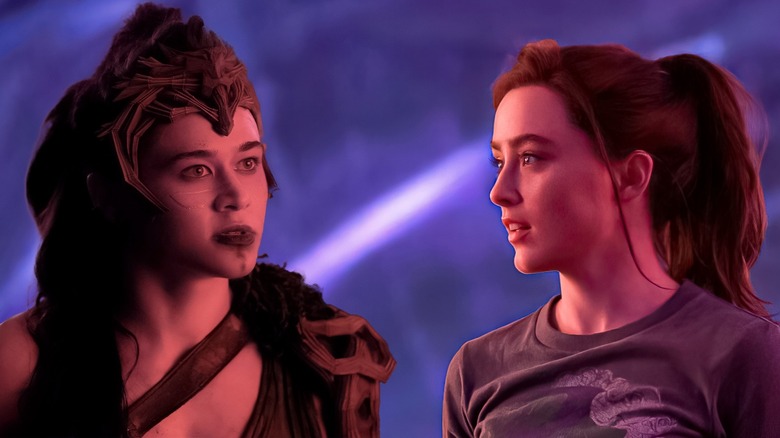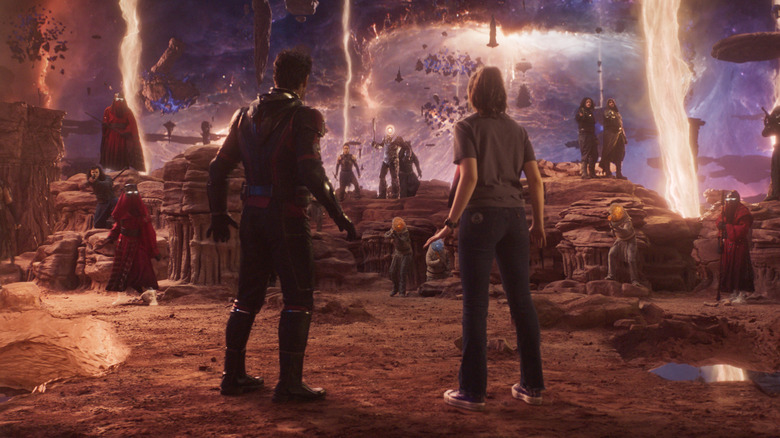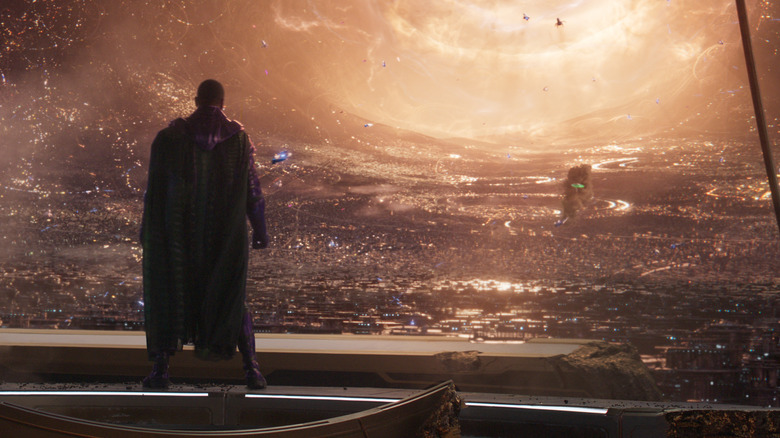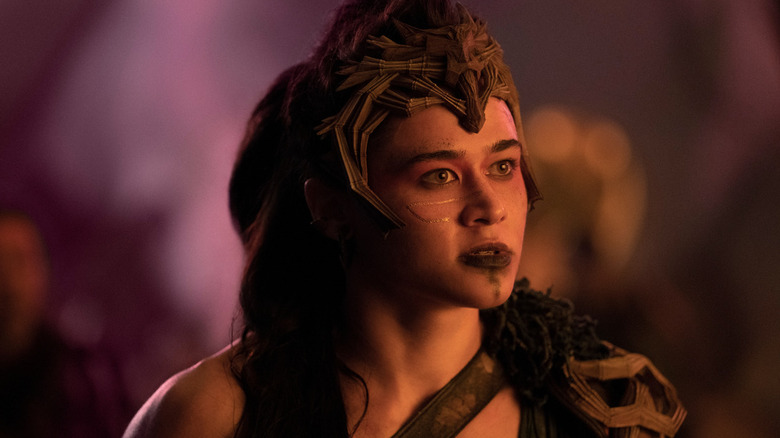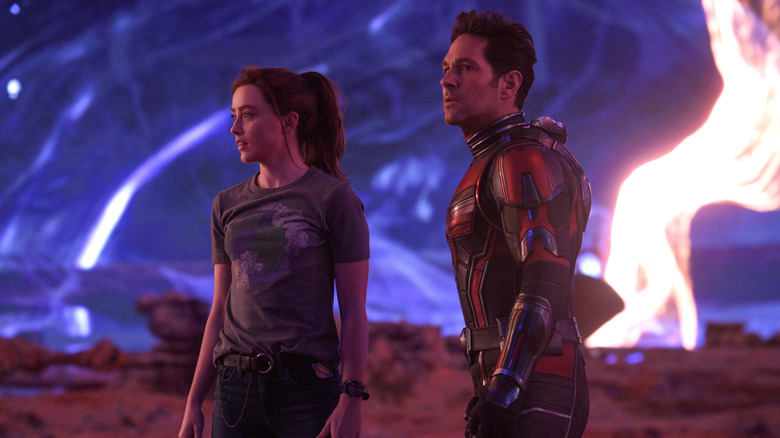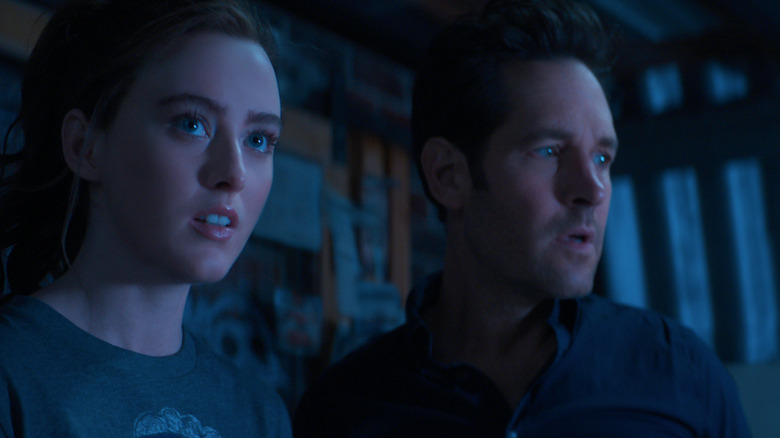Ant-Man And The Wasp: Quantumania Could Have Been Saved With A Queer Love Story
How many press releases about LGBTQ+ characters does it take for a franchise to get some quality queer representation?
In Marvel Studios' case, the jury is still out. Phase 4 of the MCU left tidbits of queerness like breadcrumbs through a globally marketable forest, all leading to the witch's house of Disney refusing to actually commit. There's America Chavez's pride pin, Valkyrie's blink-and-you'll-miss-it mention of an old girlfriend, and perhaps most worthy of praise, Phastos' wholesome domestic life with his husband in "Eternals." But these softball pitches to queer rep are always pushed to the fringes of the story. Stare at them too hard, and they disappear.
This wouldn't seem to be a problem for "Ant-Man and the Wasp: Quantumania," as the film lacks any openly queer characters to push aside. The first entry in MCU Phase 5 has received heavy criticism for a variety of issues — messy storytelling, half-baked character arcs, and an overall lack of grounding for the Quantum Realm itself — but its abject lack of LGBTQ+ representation has kept it clear from that particular line of scrutiny.
While many moviegoers still seem to be having fun with the flick, it would be hard to classify it as a homerun for Marvel. But what if we told you that the whole film could have been fixed with a single queer love story between two characters?
Cassie Lang and Jentorra are meant to be
After being pulled into the Quantum Realm at the beginning of "Quantumania," Cassie Lang (Kathryn Newton) and her father Scott aka Ant-Man (Paul Rudd) are quickly captured by mysterious warriors. This group is revealed to be a faction of freedom fighters battling Kang (Jonathan Majors), led by the fierce Jentorra (Katy O'Brian).
Her story inspires Cassie, who wants to stay and help fight against Kang, but her father only wants to get her to safety. Later in the film, Cassie saves Jentorra from Kang's prison, and together they help take his empire down from the inside. In the version of the film that we get, Cassie fawns over Jentorra in the most aggressively platonic way possible — or so it seems. She repeatedly appears flustered in her presence and tells her how cool and impressive she is.
However, if Jentorra were rewritten as a male character, it's hard not to imagine at least one physical bit or corny line about Cassie finding him dreamy. Scott might even get some classic jealous dad comedy to play with, because that's how movies like "Quantumania" get written. So why not do the same thing with Jentorra as she is? That is, apart from the obvious reason of not wanting to offend governments in profitable markets like China and Saudi Arabia, or general creative cowardice.
Indeed, the Cassie of the comic books has been shipped as queer by many readers for years (thought usually, fans want to see her with Kate Bishop). So, giving her a little crush on Jentorra would be ... well, cute! But it also could have saved the whole movie, and made it into something much greater than it is.
A Jentorra love story would help ground us in the Quantum Realm
One of the biggest problems with "Ant-Man and the Wasp: Quantumania" is that it never makes the Quantum Realm feel like a real place. We get "Star Wars" cantinas and bustling markets aplenty, but no context or real world-building to tie things together. What did the place look like before Kang's conquest? Why are there so many different species, including some that just look like straight-up humans? And most importantly, why should we care about any of it when we know none of these side characters are likely to ever return?
Jentorra could have been the lynchpin for all of this, but she also lacks development. If she were tied to the Ant-Fam in a more concrete way — say, as Cassie's love interest — this wouldn't be a problem. Picture this: Before M.O.D.O.K. (Corey Stoll) attacks the rebel camp, Scott and Cassie have a fight. He wants them to get out, and she wants to stay and help. Frustrated, she throws his Avenger title in his face and storms off, finding Jentorra in some secluded corner sharpening her blade. They talk one-on-one, giving both Cassie and the audience a real sense of how the Quantum Realm has changed, and how its residents view it. Then, M.O.D.O.K. attacks, and Jentorra gets captured because she is protecting Cassie.
Suddenly, we know and care a lot more about the world, and we have an emotional fulcrum being flown off to Kang's fortress.
Jentorra provides a foil for Ant-Man to play off of
In addition to grounding us in the Quantum Realm, a love story between Jentorra and Cassie would create the father-daughter tension "Quantumania" desperately wants to have, but fails to craft. Throughout the film, Scott and Cassie argue over his duty to help people — one that he seems to have neglected in favor of signing books. But they never stay mad at each other long enough for us to believe there's any real conflict there. Their giant hug in the third act is cute, but it's clearly trying to pay off a story arc that fails to materialize.
Now imagine the film with Jentorra as Cassie's love interest. She's a cool, calm, and collected warrior — the first one in, and the last one out, Cassie's ideal image of what an Avenger should be. Cassie clear admiration for her would be natural fuel for Scott's own character arc, giving him a foil to play against.
As it stands, Cassie's frustrations with her dad fall flat because there's no one else to compare him to. How do we know he's slacking as a superhero when he and the Wasp (Evangeline Lilly) are the only ones in the movie? If Cassie had more of a relationship with Jentorra, and if Scott felt just a little more threatened by her, this could have been fixed. It even would have fit with the film's family comedy tone, giving us some top-tier dad humor opportunities.
Centering Cassie would clean up Quantumania's mess
From the second Scott and the gang are yanked into the Quantum Realm by Kang, "Quantumania" gets messy. The group is split for most of the movie, and the cuts between the two storylines are often jarring and disorienting. Until the final battle, "Quantumania" lacks a central drive around which the plot can revolve. In another timeline, though, Cassie could have been that centerpiece.
She builds the machine that takes them to the Quantum Realm, and she's the reason Scott does what Kang wants. Why not spin the whole story around her? Imagine "Quantumania" as a cohesive coming-of-age tale for Cassie. She gets captured by Kang because she chooses to go back in to save Jentorra. Her actions lead to her family being caught, and Scott lectures her on the dangers of trying to be a superhero all the time. But she learns from her mistakes and sets things right, freeing Jentorra and kicking off the final battle.
Then, when it's time to go home, there's a hint of bittersweetness. Cassie — and by extension, the audience — has found someone she doesn't want to leave behind, but she knows her place is elsewhere. Maybe they even part with a cheeky kiss — character development for the inevitable "Young Avengers" movie. As it stands, Cassie's only real character growth comes from the Pym Particles she slaps on her suit.
Ignoring opportunities for queer storylines hurts the final product in Quantumania
Giving Cassie and Jentorra a cute relationship in "Quantumania" could have done wonders for the film. Queer storylines don't have to be PR talking points that define a film's cultural footprint, after all. They can simply be good ideas that make sense in the context of the larger narrative.
Disney has bungled this idea in the past, perhaps most famously in the instance of the "Star Wars" sequels' Finn (John Boyega) and Poe Dameron (Oscar Isaac). Fans shipped these characters from the jump, but the studio was so averse to a gay romance that they gave Finn a new love interest in every single movie and ultimately shoved him to the side. And of course, there are other notable examples, like the "Supernatural" Destiel ship. The truth is that, sometimes, you just accidentally write two people in love, and that's exactly what your story needs — regardless of what their genders are. And when a film is as devoid of good storytelling as "Ant-Man and the Wasp: Quantumania," you don't pass up a good idea just because it's too gay for the international box office.
